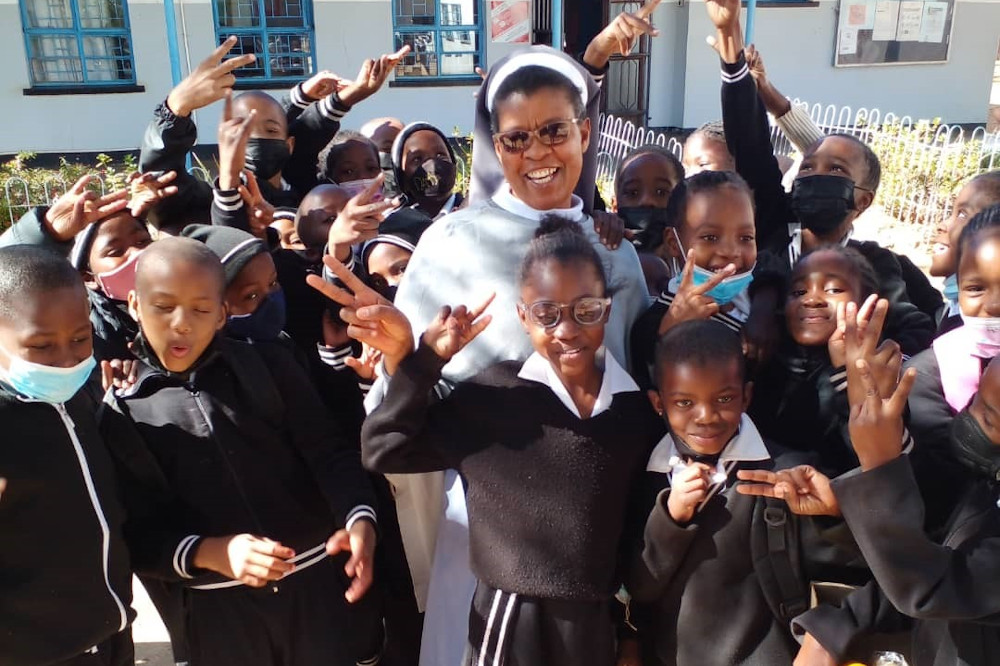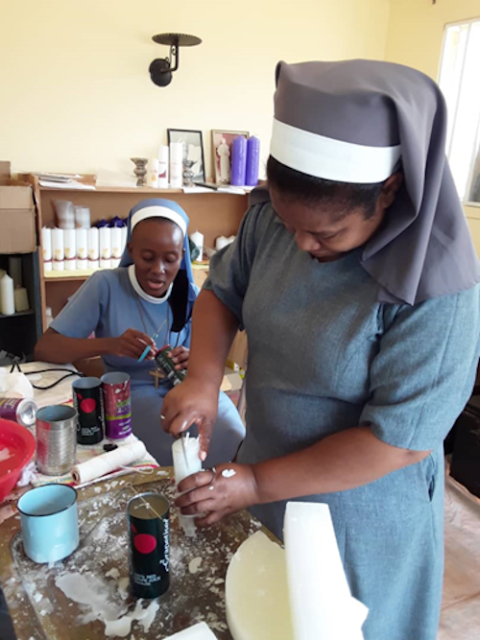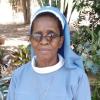
A Sister of Calvary, one of four congregations of sisters in Botswana, working as a teacher at a local school. (Courtesy photo)
I am a Sister of Calvary, one of four congregations of sisters in Botswana. My country is small, about the size of the U.S. state of Texas, with a population of about 2.5 million. About half of the country is Christian; the rest is a mixture of Indigenous belief systems and other faiths like Muslim and Hindu. Catholics make up a small percentage of the Christian population which may explain why there are only few congregations of sisters in the country.
Many of the people in Botswana live in villages, and I too grew up in that setting. Not many people were Christians at that time, and in fact, I was the first in my family to become a Christian. Of course, people believed in God, and practiced traditional religion. In my family, there were eight children, four boys and four girls. The eldest boy and girl died before I was born, and both my parents died in 1965, the year I turned 12. My mother's brother took the six of us into his family of eight children and supported us.
We were subsistence farmers, which meant we worked very hard because Botswana is not known for agriculture. Seventy percent of our country is part of the Kalahari Desert. Although it is not the sandy part of the desert, the soil is not very productive for growing food. However, a major part of the country is good for grazing cows, but small farmers usually have only small plots of land, and therefore not enough space for raising cattle — which is mostly a commercial business. Food insecurity is one of our major challenges, so our most important import is food from our neighbors: Zambia, Namibia and South Africa.
Education is highly valued in Botswana, which has one of the highest percentages of literacy in the world — 86.82%. The reason has been that education is free to all and the government is doing its best to make sure that all children receive some kind of education. I was fortunate to attend a Catholic primary school run by the Sisters of the Cross and Passion, and priests who were missionaries from Ireland. It was they who inspired me to become a sister.
At the time that I entered, only our local congregation was accepting vocations. Other congregations now have invited vocations, but with very little response. It is even difficult for us as a local congregation to get vocations.
Advertisement
Four Cross and Passion or Passionist sisters came from Ireland in 1952 to open schools and health centers, and to engage in pastoral work. It was some time before they invited Botswana women to join them, and today there are three sisters from Botswana in their community. My congregation, the Sisters of Calvary, is the only local congregation and our first formators were these Cross and Passion Sisters. We were founded in 1966 by Bishop Urban Charles Murphy, an Irish Cross and Passion priest. There are a total of 35 sisters in our congregation, all native, with 27 finally professed.
After independence from Great Britain, Botswana gradually developed into a thriving, well-governed country. Diamonds, cattle and copper are our three major exports. There are three major diamond mines in the country, along with other gem mines. Much of family incomes come from members working in the mines, both here in Botswana and South Africa.
However, wealth accumulates in the cities but not in rural areas, which remain underserved. In the early 1980s, the country was severely affected by HIV/AIDS, partly because of people traveling outside the country to work in the mines in South Africa. But the government eventually stepped in and provided free antiviral medicine. So although we have cases, we have not suffered large numbers again.
Our congregation was founded after the Second Vatican Council to evangelize our own people. Although small, we engage in a variety of apostolates, but teaching and nursing are strongest because the government sponsors free training for those who qualify after high school.

Sisters of Charity in Botswana make candles (Courtesy photo)
Some of our sisters engage in pastoral and social work, but these services receive very little payment. Because of the difficulties in finding employment, sisters tend to work in diverse areas and so transportation is another challenge. Without adequate salaries, we cannot provide needed vehicles for sisters working in different ministries. Public transport is also unreliable. In the past our sisters had no problem finding employment with a form five level education, but now even though they have achieved form five, ordinary levels, or even have university degrees, employment is difficult. My congregation is really struggling because of these trends and we are searching ways to generate income.
At times, we find these worries intruding on our prayer and community life and we do not give either the time we need. But, in spite of these struggles — in the end — it is our spirituality that gives us courage to keep going and trying new things. We try to follow the path of the self-sacrificing Jesus who, even in his own trials, had compassion for the brokenness of the people, families, prisoners and the marginalized. Having support to grow spiritually is one thing that we miss in our rural areas. Opportunity for spiritual direction is extremely limited as there are few priests or sisters trained in this skill and at times it seems that we do not really trust each other.
We do have a national conference for sisters that provides some support and opportunity for sharing challenges, but it is hard to arrange meetings and get to know each other because of distances and our many apostolic commitments. So far, only two congregations belong to the regional conference of Sisters of Southern Africa, and often I am the only one who attends meetings. I have the privilege of serving on its executive committee — which entails a lot of work, traveling there and having Zoom meetings — but the meetings do provide us with the chance to meet other sisters, to learn how they are handling things and finding ways to support themselves. Collaboration in general is challenging because of distances, so we are not much engaged as groups.
I sometimes worry about the future of our congregation because we have only junior professed sisters, no novices or postulants. Even though our sisters work a lot with youth, recruiting young women is challenging. When talking with them about vocations, they express instead their desire for a good life, having things they have not had; some say they do not like the idea of following rules that they have heard about.
I would say our greatest challenge is being the only local congregation in the country. It is true that the Cross and Passion Sisters also have challenges, but it is very different belonging to a local congregation that is still growing. One of our biggest blessings, on the other hand, are these Cross and Passion Sisters who have stayed with us all these years as we and our country have grown and developed. That is a wonderful comfort.





